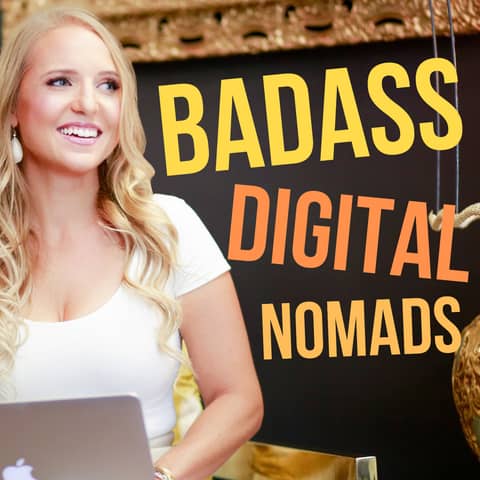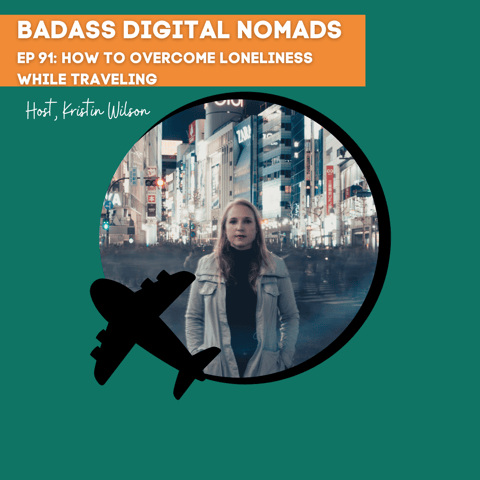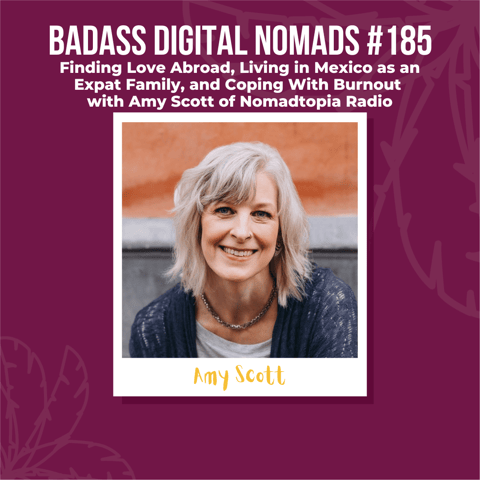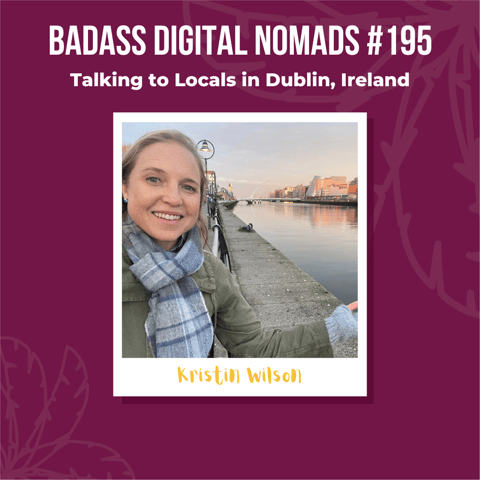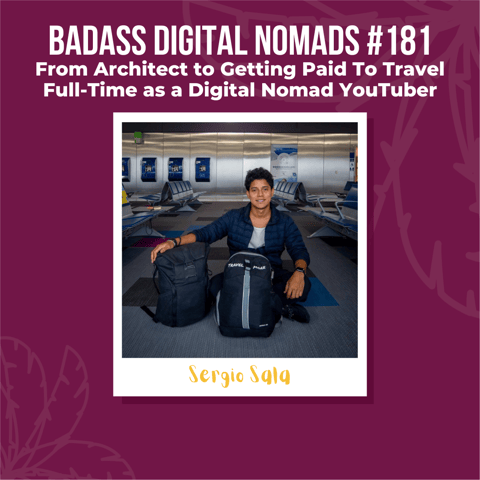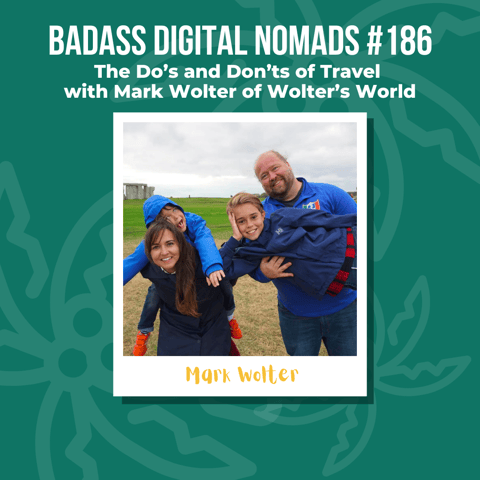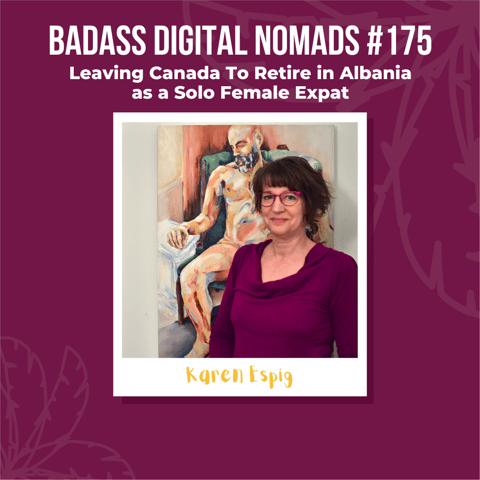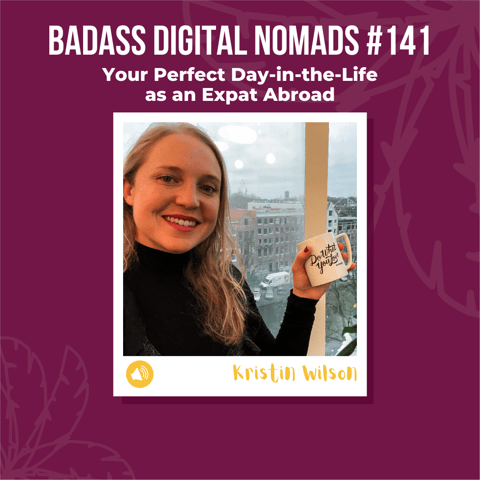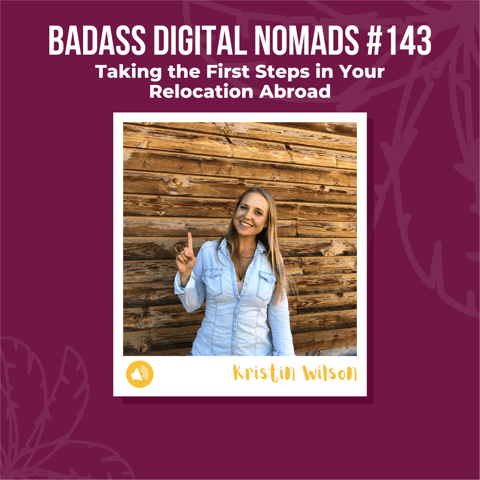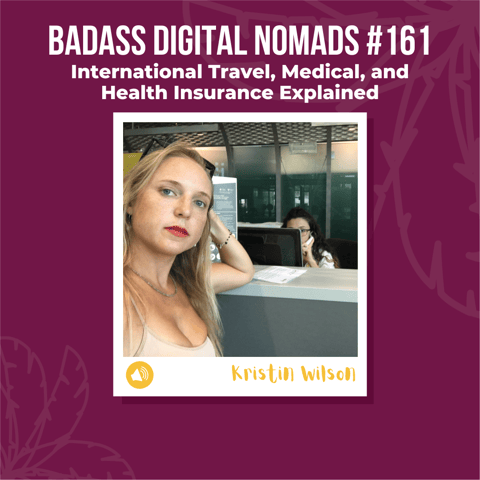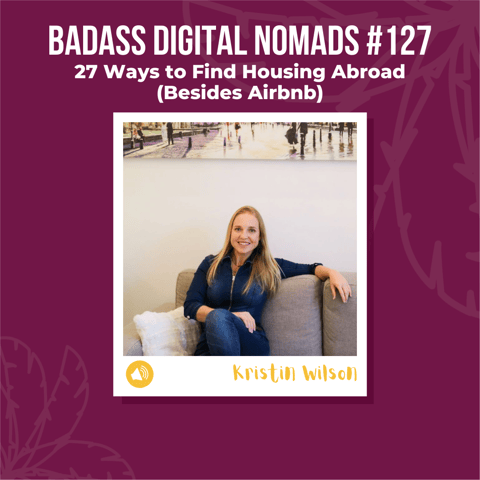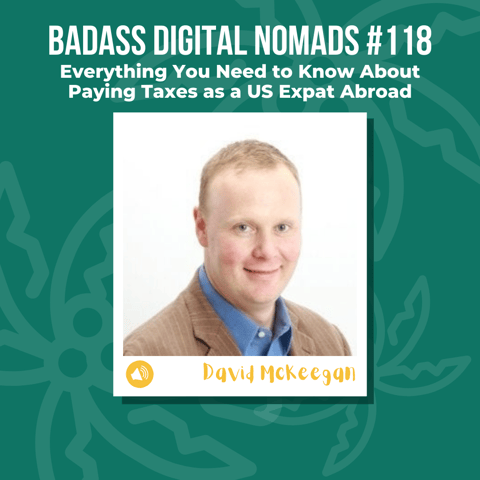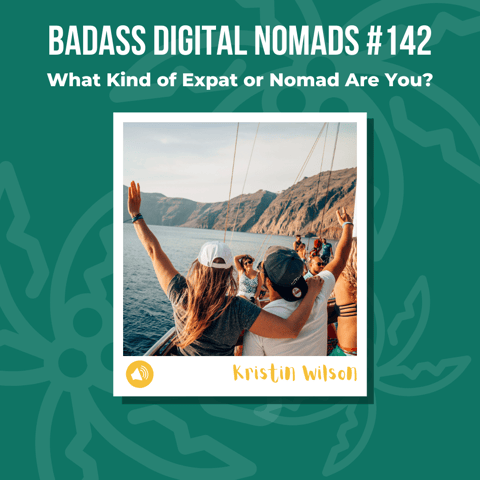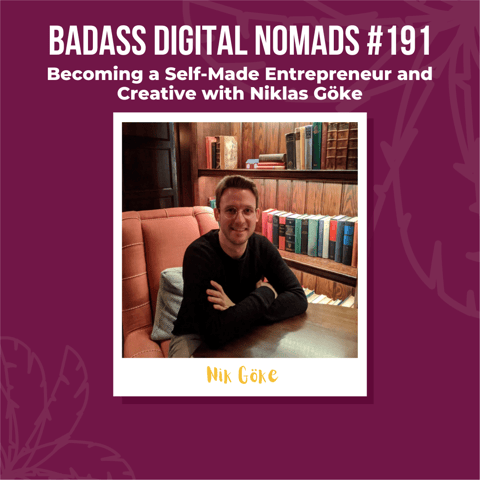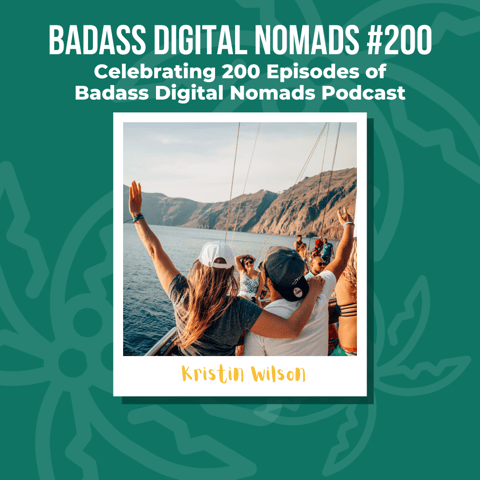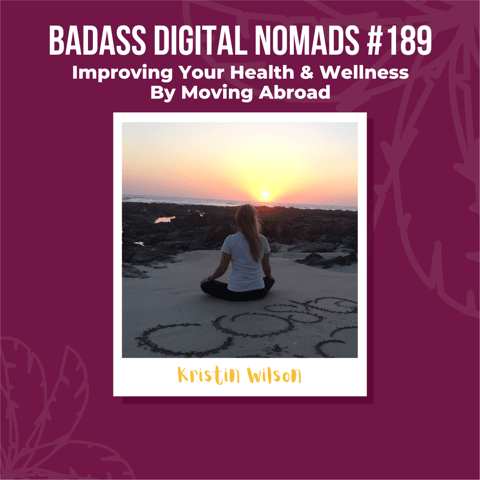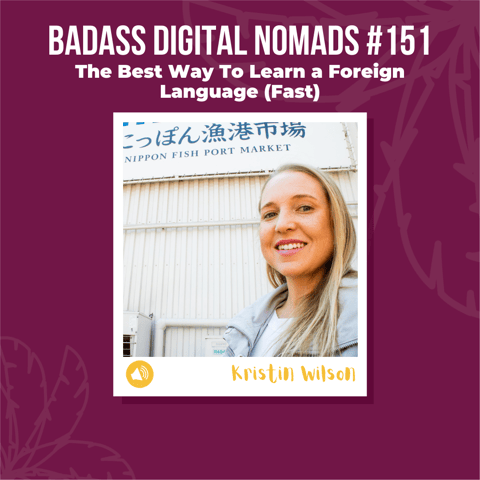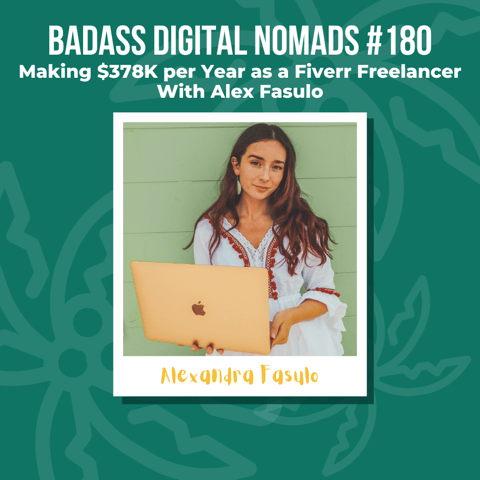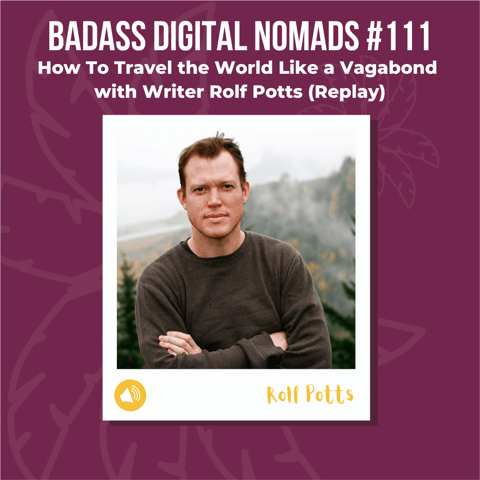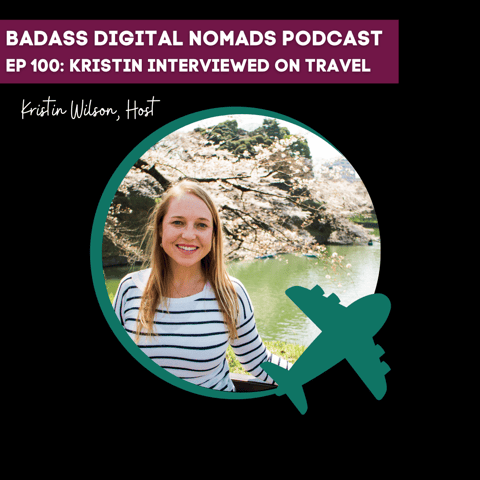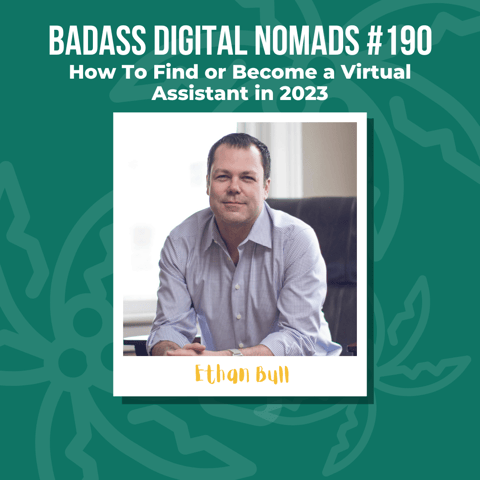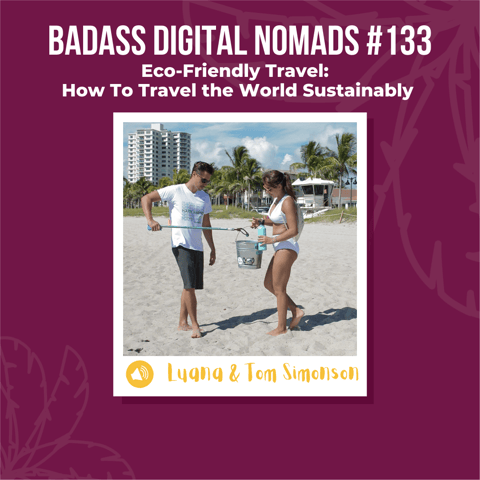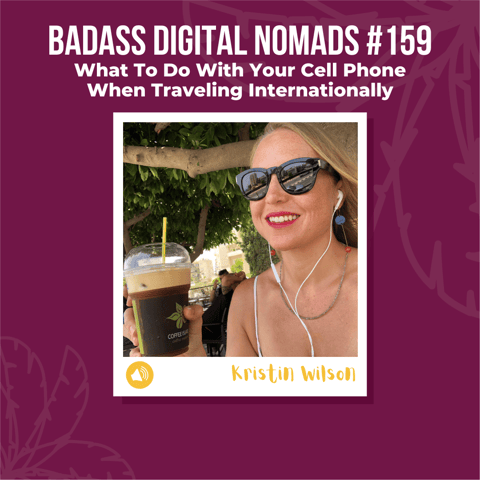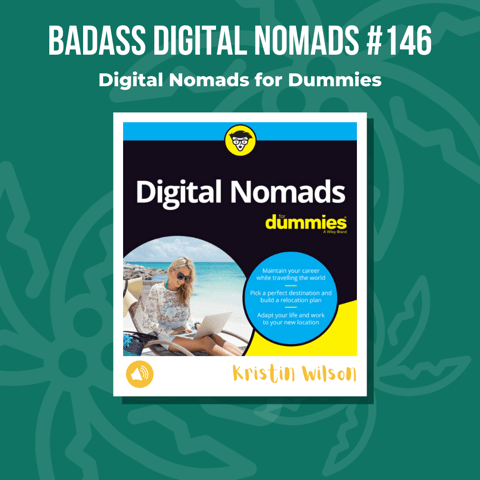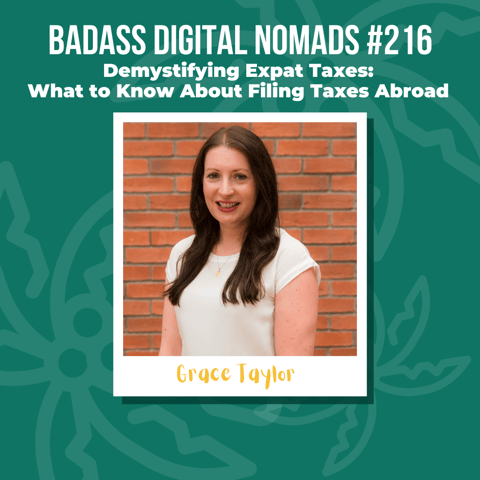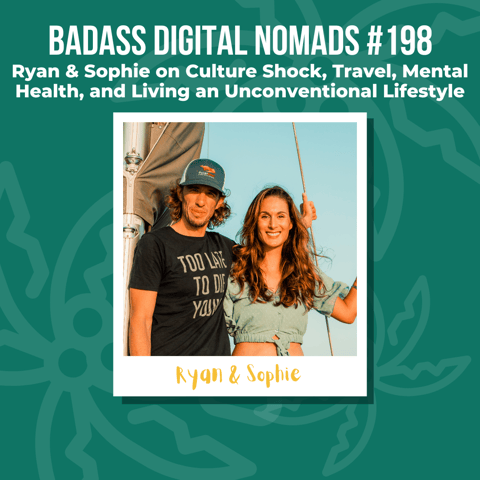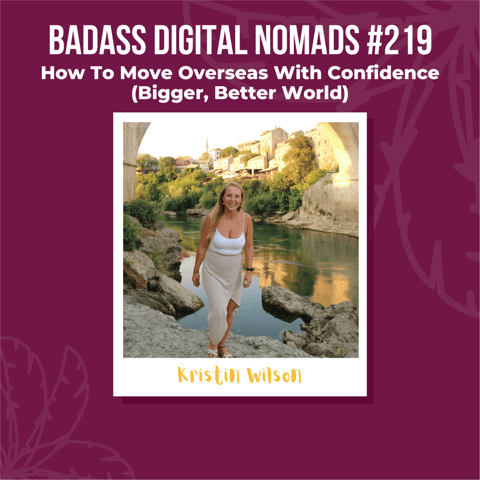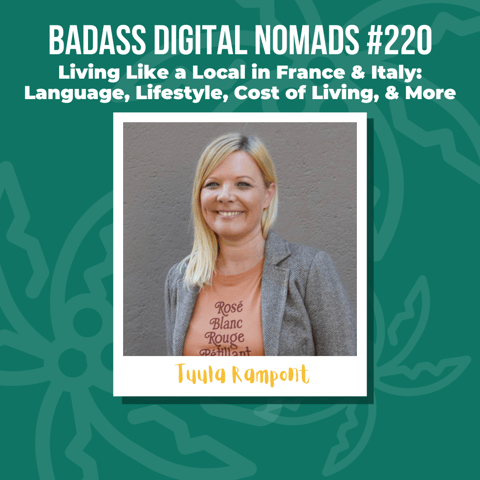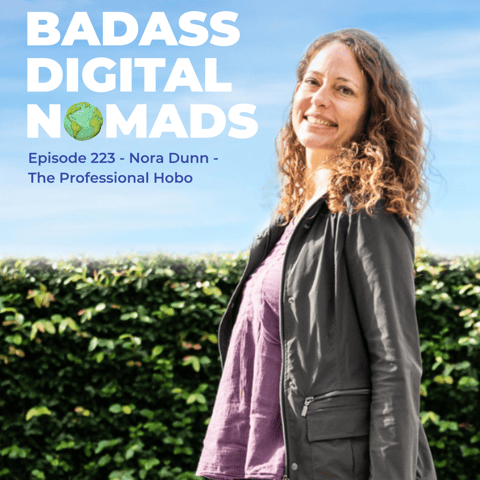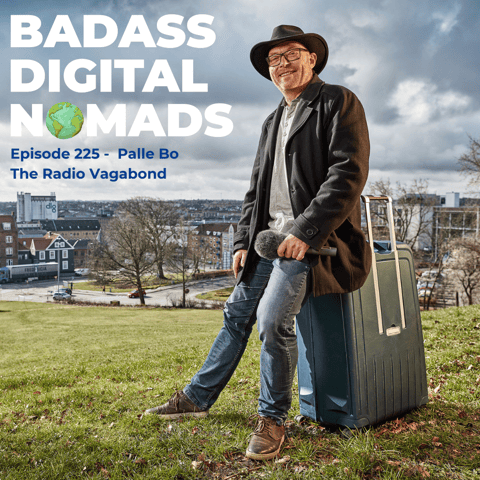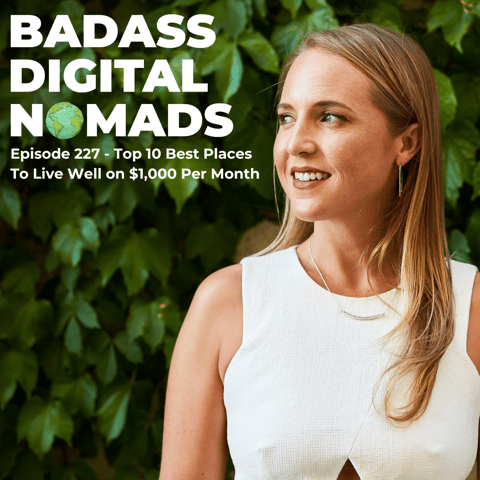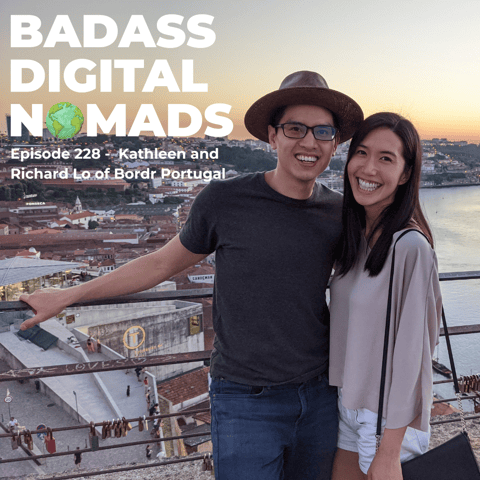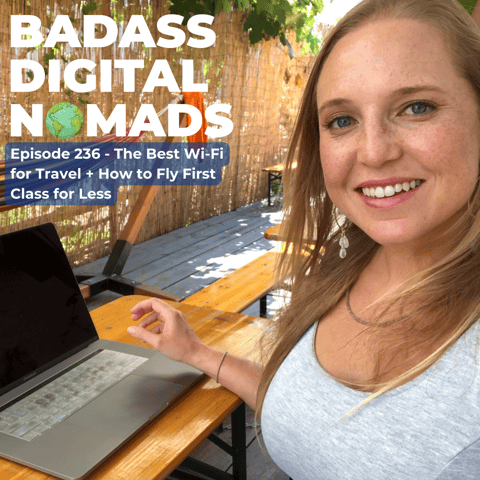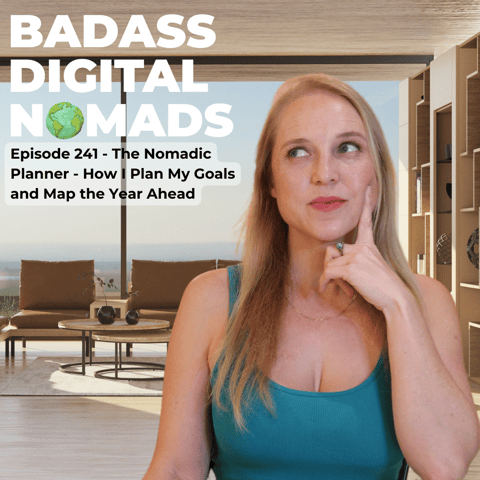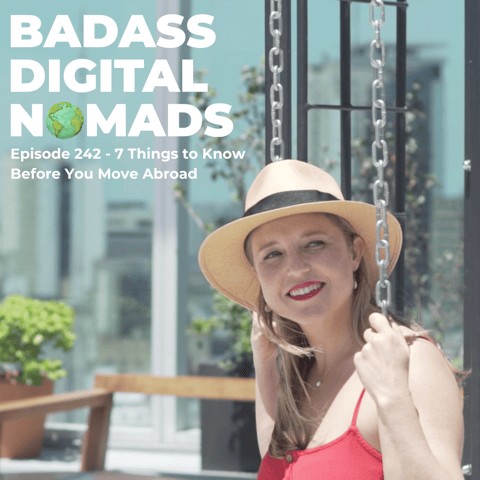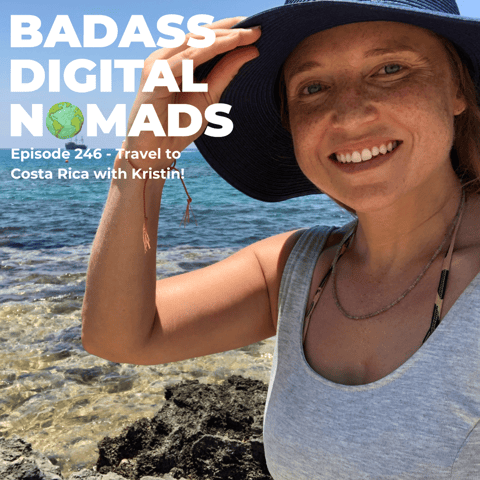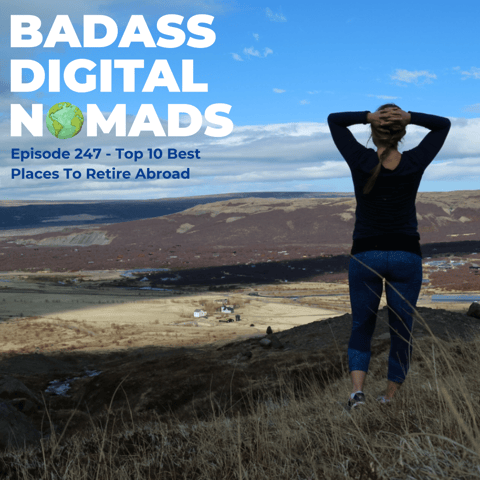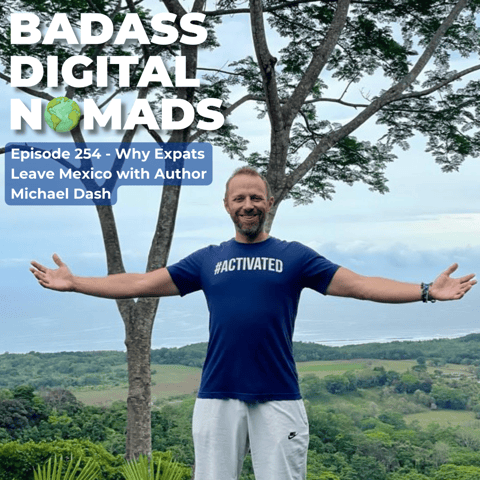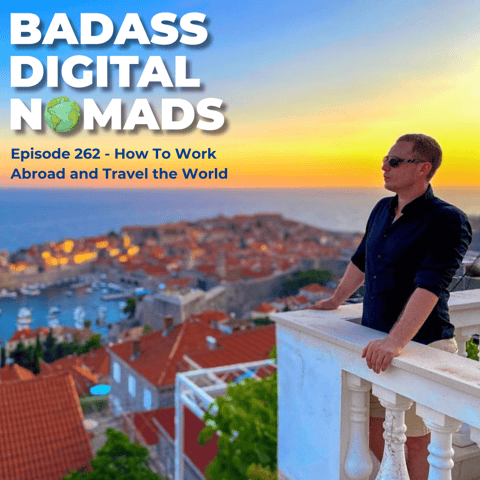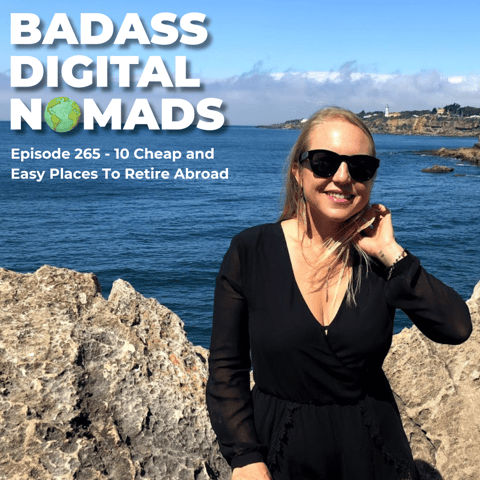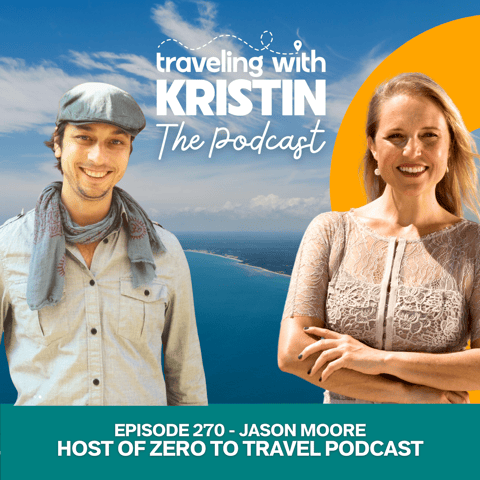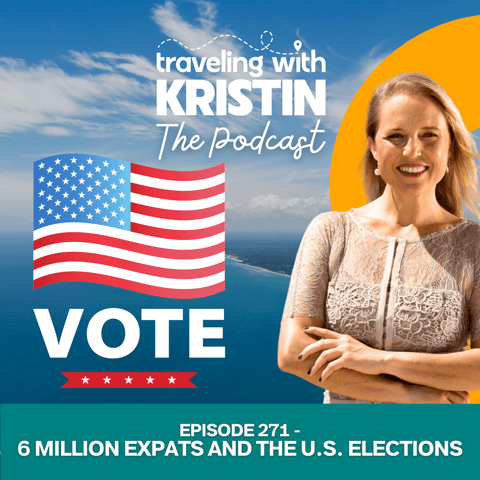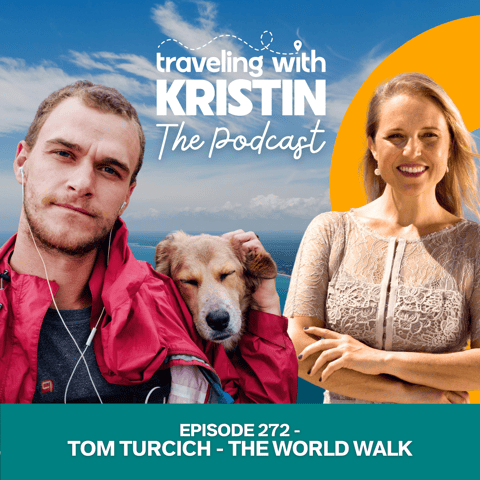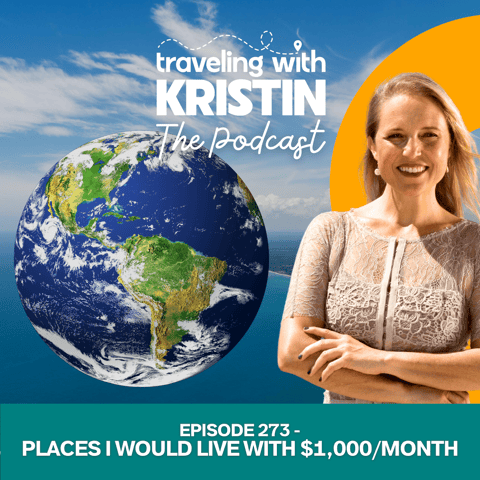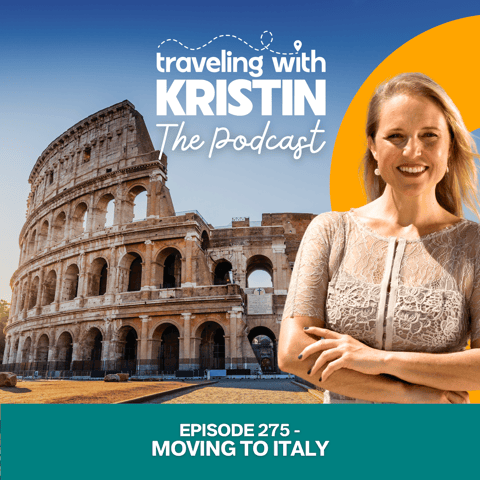Traveling the United States in an RV as a Freelancing Family With Two Kids
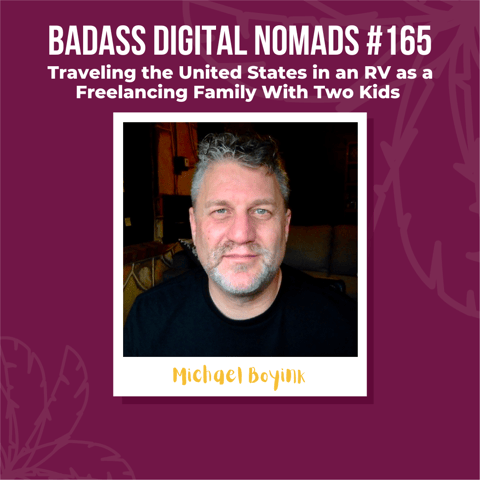
Living in an RV with his wife and two kids, Michael Boyink has been traveling around the United States for the past 10 years as a freelancer. How has he supported his lifestyle for so long? Listen in as Kristin talks with Michael about working independently as a freelancer, raising a family on the road, and how to truly thrive while living long-term in an RV.
Living in an RV with his wife and two kids, Michael Boyink has been traveling around the United States for the past 10 years as a freelancer. How has he supported his lifestyle for so long?
Listen in as Kristin talks with Michael about working independently as a freelancer, raising a family on the road, and how to truly thrive while living long-term in an RV. Michael also shares sneak peeks into his new memoir, Driven to Wonder: Eight Years in an RV with two kids.
You’ll learn why Michael and his wife chose to hit the road and experience van life along with the steps they took to make the transition from house to RV possible.
Plus, hear how they transitioned their kids from the traditional school system to a homeschool/worldschool lifestyle.
Episode 165 Special Offers:
GIVEAWAY! The first two people to leave a 5-star review of Badass Digital Nomads will receive a FREE COPY of Michael’s book, Driven to Wonder.
How to win:
- Leave a 5-star review on our website, Apple Podcasts, or Spotify.
- Email a screenshot of your review to hello@travelingwithkristin.com.
EPISODE 165 TOPICS DISCUSSED/WHAT YOU’LL LEARN:
- Michael’s inspiration and motivation for beginning van life.
- Transitioning kids to van life from a traditional home life.
- Traveling with purpose vs. Traveling out of curiosity - Which is more fulfilling?
- The costs of living in a van vs. a house.
- Making friends and finding community while living in a van/RV (even as an introvert).
- Productivity tips for remote workers, traveling freelancers, and digital nomads.
- Homeschooling and Worldschooling tips, advice, and resources.
- Challenges and benefits of being an online freelancer & Why Michael went back to corporate life.
- How they choose where to travel & Recommended destinations to visit in the US.
QUESTIONS ANSWERED:
- How did your kids feel about growing up in an RV?
- Have they continued with van life or transitioned to a traditional lifestyle?
- Did you travel before buying an RV?
- Why did you decide to leave your jobs and hometown to travel?
- How do you get Wifi so you can work remotely from your van?
- Do you make more as a freelancer than you did in your corporate job?
Lightning Round
- How do you stay productive working remotely from a van/RV?
- How do you do your laundry while living in a van?
- How do you receive your mail?
- Gas or diesel for van life?
- If you started van life again, which van would you buy?
- How did you overcome the fears of homeschooling your kids while traveling?
- How has travel changed you?
SHOW NOTES & RESOURCES
Books Mentioned:
- Driven to Wonder: Eight Years in an RV with two kids by Michael Boyink
- Two Years Before The Mast by Richard Henry Dana
- Living the RV Life by Marc and Julie Bennett
Related Podcasts:
- Leaving Corporate America To Become a Full-Time Traveling Family (World Towning Part 1)
- How To Find Your Home and Your Community Abroad (World Towning Part 2)
- Moving Overseas with 3 Kids and Investing in Real Estate Abroad (Founders of Greenback Tax Services)
- How To Make Money From a Sailboat With No Experience
Related Videos:
Recommended Resources for Digital Nomads:
- Remote Work: The Caretaker Gazette
- Mail Forwarding Services: PostScanMail, US Global Mail, MyRVMail
- RV Lifestyle Blog: RVLOVE
- Rent a Camper: Hippie Camper
Recommended Destinations to Visit in the US:
- Eastern Arizona
- Kinston, North Carolina
- Hoh Rain Forest, Washington
Connect with Michael:
Connect with Kristin:
- Follow on Instagram
- Subscribe to Traveling with Kristin on YouTube
- Subscribe to Digital Nomad TV on YouTube
- Join the Badass Digital Nomads Facebook Group
...........................................................................................
Support the Badass Digital Nomads Podcast:
- Buy Kristin a Coffee
- Become a Patron
- Leave a 5-Star Review
- Buy Official Merch
- www.badassdigitalnomads.com
...........................................................................................
A special thank you to Kristin's Patrons!
Warm welcome to new patrons, Em Winn, Daniel Sullivan, and Dion!
Become a Patron for $5/month at Patreon.com/travelingwithkristin
...........................................................................................
Podcast descriptions may contain affiliate links of products and services we use and recommend at no additional cost to you.
Introduction: Welcome to Badass Digital Nomads, where we're pushing the boundaries of remote work and travel, all while staying grounded with a little bit of old school philosophy, self-development, and business advice from our guests.
Kristin Wilson, Host: Hey there, Kristin, from traveling with Kristin here. And welcome to Episode 165 of Badass Digital Nomads. Today by popular demand, we have an interview talking about traveling as a family and in this case, traveling in an RV. My guest today is Michael Boyink, who has been able to sustain an RV lifestyle for more than a decade, living with his wife and two kids while traveling around the United States. Nearing close to retirement now, Michael has reinvented himself and his career multiple times. He talks about after getting laid off around September 11th, how he was able to go independent and work for himself as a freelancer, eventually starting his own company, and today finding a remote job. In today's conversation, Michael shares how he and his wife came up with the idea to hit the road and experience vanlife and also the steps that they took to make that transition possible.
How much money they saved, what kind of RV they purchased, and how they transitioned their kids from the traditional school system to home schooling and world schooling. He also shares tips on how he was able to stay productive and sustain his lifestyle while working from the van, and also how he and his family were able to make friends and find more community while traveling than they did while living at home, even as self-proclaimed introverts.
At the end, we do a fun lightning round where I polter him with Vanlife related questions, and he also shares about his new memoir called Driven to Wonder eight years in an RV with two kids. Just a note on today's interview that the audio quality is not as good as it usually is on my guests end because unfortunately, he accidentally selected the wrong input for his microphone when recording the audio.
But my editor, Gaston and I worked our magic and did what we could to improve the quality for you, for your listening pleasure. These things happen sometimes in the podcast world, but it was a great interview that I didn't want to lose that value for you and hey, the show must go on. Michael and his wife Carissa have been featured in mainstream media outlets such as the Huffington Post, Seattle Times, Tiny House Magazine and more. I hope you enjoy our conversation today.
Safety Wing
And if you're planning on hitting the road sometime soon, make sure that you have insurance coverage. You can sign up for emergency travel, medical insurance, or monthly remote health insurance through a Safety Wing using our link in the show notes. Safety Wing offers nomad insurance for digital nomads and world travelers that you can get for short term trips or on a monthly plan.
Starting at $42. And they also have global health coverage starting at $111 per person per month. That can be for individuals or remote employees and teams. Safety wing's premium health insurance works in every country across the world, and you can get coverage while residing in more than 175 different countries. Use our link in the show notes to get more information and to check prices. And I hope you enjoy today's show.
Podcast Interview:
Kristin: Hey, everyone, welcome back to Badass Digital Nomads. And today I am joined by Michael Boyink, who is an RV expert, self-made expert, author, freelancer, web developer. He said a lot of things. He's a jack of all trades as many of us are. And he is on the show today to talk with us about how to survive and thrive while living in an RV for almost ten years, I believe, with two kids and and letting your kids grow up in the RV before setting them on their way into the world, into real life as adults. And so he has survived to tell the tale and he's here to help. Give us some insight into that. You know, a lot of our listeners have asked for more tips on traveling as a family and RV life and vanlife. So welcome, Mike.
Michael:
Thank you. Thanks for having me.
Kristin:
And where are you joining us from today?
Michael:
We are in Missouri, which you've never heard of. If you're going to triangulate Springfield, Missouri and Branson, Missouri, to the northeast or more down there in the middle of the Ozarks.
Kristin:
Oh, okay. That's actually a place I haven't been to, but it sounds nice.
Michael:
We had never been there either before. Moving here.
Kristin:
Oh. Where were you from originally?
Michael:
We launched out of Holland, Michigan.
Kristin:
Okay, so not too far away. Well, before we get into the RV stuff, bring us back to where it all started. I saw in your book, which we'll link to in the show notes, it's called Driven to Want, Driven to Wonder, Not Wander. We'll talk about that, too. I saw that one of your biggest regrets was not jumping into this lifestyle sooner and so bring us back to the very beginning of when did you start to have this idea of living in an RV and hitting the road? And how long was it between when you first had the idea and when you actually did it?
Michael:
Okay. So it goes back to actually– I got laid off out of the corporate world in 2002. So it was one of those post 9/11 events – I had a job in West Michigan as the office furniture central headquarters of the world. So I was working with a large office furniture company, 9/11 came, shrink the market, then three rounds of layoffs. And I find myself at home looking for a job, sort of networking for all my previous employers and getting got a job offer. But I got project offers. And so I thought, well, I will string these together. And, you know, worst case, we had some severance pay that was kind of a landing pad for us.
You know, worst case, you know, couple months from now, I'll be looking for a job again. That never really happened. I get plenty more of a job. So that the corporate layoff set us up to be location independent because all those jobs were just they were online web development jobs. And at some point we realize, hey, we could do this anywhere, at the same time, we were homeschoolers. And so my office was in the basement, so upstairs would be my wife homeschooling the kids, and I would be downstairs working and at the same time kind of around all of us. And there was a bit of a housing crisis going on, like what we're seeing now a little bit.
And we just we felt like we were going to die in the house, that we just didn't see a future that had us going anywhere other than just living there, getting old and dying. And it was our first homes. And then at some point it just –I we can't remember who actually came up with the idea was I mean, we could just sell all of this, you know, and jump in an RV and do this anywhere.
Because the only thing really holding us in our location was kind of the church, church community and a few friends around town other than that – My income was location independent. We could homeschool anywhere, so we just we called it actually our pipe dream. We'd just more have conversation than anything. We would just email things back and forth to each other and we you were in the middle of telling a friend this complete dream idea, and you just looked at us and why don't you do that?
And we at that point, we decided, let's look for reasons to not do this. Certainly someone is going to tell us that this is just not possible, shouldn't do it. You're stupid, you're crazy or whatever. So we talked to the bank and we talked to – look at our finances and looked at our, you know, our housing situation, our mortgage.
And we just never found any good reason to not do it. We really looked at our income and what are these cost? And if we can buy an RV and still keep the house, we were we didn't go all in at first. It's hard to make decisions like am I buying an RV to live in for one years, two years or ten years?
Kristin:
Yeah.
Michael:
So buy, buy, buy a truck that's going to be good for a year or two or just it's going to last ten years. And, you know, are we going to like this or are we going to fall hard, you know, the money going to run out? So we we kind of framed it as a year. Let's just let's call this our one year adventure that helps us figure out, you know, what kind of RV we can be living for a year, what can we deal with for a year?
What kind of income do we need for a year? And so sometimes we found like sometimes constraints are good because it just they help you make decisions and move forward in a certain direction. So so we, we called it our one year family adventure. We kept our house where we found a friend within it while we were gone and just thought there would be someone there that would come and go to pieces of all of us.
And we watched. So it was in September of 2010.
Kristin:
Wow. And how old were your kids at that time?
Michael:
There were 12 and 13.
Kristin:
And what was their opinion on this transition?
Michael:
So we've got two kids. My oldest is a boy and this is a girl. My son was he's more of the more outgoing one. He was all about it. Excited to go. My daughter was not happy to go. She had just kind of recently made some friends in the neighborhood. She was always a little more change averse. And my son was, you know, so we –you know, we read Steinbeck. Steinbeck says, you know, trips continue in your minds long after they've stopped in time and space. And so after you've slept, you stopped traveling.
You kind of you know, this book is evidence of that. I'm obviously still on the trip, you know, three years later, we live with our daughter and like, we realize that the trip hadn't started for her yet, even though she was moving in time and space, she really was not on the trip with us. And it took a few –it took a calamity really -we a- one of the things that we did for money was we were doing training around, of course, softwares and schedule training classes and then drive there in a hotel room, an alternative conference room and in classes.
We had one scheduled in Jordan, and on the way to Atlanta we passed like a convoy of like 60 power line trucks. And I've since learned that if you're on the highway and you've got to pass a line of 60 power line trucks, that's not a good thing.
Kristin:
Uh-Oh
Michael:
because what it means is bad weather is coming in and they are driving to where they think they're going to be needed to get electricity back again. So what was happening was a big ice storm is coming in. And, you know, we managed to get into L.A. right before it hit and then literally like two inches of ice, which just decimates that town. They don't have snow plows and like, you know, northern cities would have. So it put us there in the hotel and we basically were there twice as long as we planned to be.
But at the end of all of that, we were going back to the RV and my daughter said, you know, I just want to go home. But the way she said home just sounded different. What do you mean? Back to the RV is home? Or back to Michigan in the house. And she said, I don't care. I just want to be back home.
And pretty much that's where she joined us on the trip. And we just kind of took that, you know, that kind of bad experience to kind of reorient her and get her to join in.
Kristin:
Oh, yeah. You know, brings me back to when I was moving from my hometown of Vero Beach to Saint Augustine, and my dad wanted us to move. I had I don't know why he wanted to move. He got a new job and I was 12, turning 13. And my brother was –he was all in. I did not want to move because I was in, you know, about to go into high school the next year. So I like my whole life had been in this other town and I had so many friends and everything, but I remember my dad telling me, You're going to make new friends.
And then I became best friends with my neighbor. And I remember the first day we moved into our new neighborhood and then my life completely changed from, from that. And it's tough with kids, especially when they're teenagers, because they do have a strong opinion either way. And from all of the families I've talked to, they try to be diplomatic with their kids because you know, they're doing this alternative lifestyle where they're taking their kids out of traditional school or they're continuing home school, but in a more remote and mobile fashion and so, you know, they want their kids to have that agency and that input into the family decisions.
But at the same time, being the parents they want to, you know, kind of take charge and do what they think is best for the family. And so I'm glad that my parents forced me to move to Saint Augustine because I you know, I think my life went in a better direction. And my brother, he –St. Augustine's a big surf town. So my brother became a surf photographer. I became a surfer. And that love of surfing really was the impetus for my travel at the beginning. And so here I am, you know, traveling with Kristin. But I think that that move to Saint Augustine and getting into surfing and traveling to Puerto Rico and California and Mexico, that that– those were the first trips that I ever took where they were all related to surfing, studying abroad in Australia and going to Hawaii and, and yeah, that probably wouldn't have happened had we stayed in Vero Beach.
So it's –so it's like the butterfly effect, you know, one little change in direction can really take you to a different destination over time and you never know what would have happened either way. But it's interesting to hear how your daughter came on board and how old is she now?
Michael:
She'll be 24 in August.
Kristin:
And so did your kids go to college or what did they do after this experience?
Michael:
She got married, so she came and she actually settled with us here in the US for a little while and then moved out and got married. She lives about 3 hours to the west of Wisconsin Missouri, and son runs a shipping department at a manufacturer back in West Michigan.
Kristin:
They live in one town then?
Michael:
Yep, yep. Although my son is travel a lot. He did a YYM which is a youth mission endeavor. So he's been to Australia, in Germany and several months in New York City. This is what I mean. traveling was kind of valuable. He left us at 18 years old and I think within a couple of months, he scheduled himself a trip to New York City. There was this play or something he wanted to see. 15:55
So he just books himself a flight and when I was eighteen I would have never fly alone to New York City and just walk out on the streets of New York, it’s something I never would have done.
Kristin:
Yeah. And so they value that experience. Like, do you guys ever talk about that or do they reflect on, you know, growing up in an RV or what is their feeling about it?
Michael:
We haven't had any discussions then. When the book was nearing the end, I'm like, I need you guys to just write a couple paragraphs, now is - you're 20 somethings –know, how do you feel about what we did? And so they both did that for me and that's in the back of the book because you don't hear that a whole lot in the traveling world.
You hear a lot about people who are doing it or currently doing it. But you know, you only hear that perspective from the kids about what it was like to grow up that way.
Kristin:
Yeah. Can you give us a sneak peek to the back of the book? Because I talked with a lot of people, whether kids are still young.
Michael:
Yeah. So my son, he's kind of rambles on about it. He sees it -he sees a travel, helped him and helped him travel and he still enjoys travel. These like there's just there's parts of life. Now, I hear the house with his girlfriend and like we have neighbors that don't move.. I deal with these neighbors that are just always the same as in order to learn how to be a neighbor, because we were just always on the move in different neighborhoods.
So there's there's all parts of our it doesn't feel like he got the training or the experience to kind of cope with more, quote and quote normal life.
Kristin:
Yeah, I have heard that from the the sailing families as well. I just talked to another one and the dad was saying, you know, we talk about meeting people and he's like, well, you know, you just pull into the port or the marina and you see who's there and then you may or may not ever see them again.
And that just kind of becomes normal. And then when you go to one place, it's almost weird that everyone's just there. Yeah, I noticed that during the pandemic I've been in Miami and the people who live in my building, they've been there for 14 years and I'm like, Oh my God, I've been here for a year and a half.
I got to get out of here.I feel stagnant if I'm in one place for too long with that's just me, you know, once a nomad, always a nomad. And then what about your daughter?
Michael:
I would think she's of sentimental about me, but she's not in a position right now where they're not going to do much traveling. But I had her. She's a really good editor, so when it came time to copy it at the book, I gave it to my wife and I sent a couple of copies for her to go through and I just got some feedback like, going through this, you know, and crying a lot.
Kristin:
So yeah, it is sentimental. I was just, just rereading some of my journal from the past year and I was contemplating why are travel memories so indelible in our minds and, you know, I can trace back to specific days that I had when I was 16 and family road trips or the first time on an airplane or walking on the beach in La Jolla, California, or sitting in the back of a truck riding down the street in Puerto Rico. Like I can remember entire days of touring Seattle with my mom and where we went for dinner in this Italian restaurant. And we went to the library and it's like for some reason, you know, in normal, quote unquote life, all the days can blur together and it's really hard to distinguish.
But then for some reason, with travel, I think it's because it's a new, new surroundings and your brain must click into some other type of observational gear, which I need to research more before I start. You know, theories.
Michael:
I think it forces you to live in the moment.
Kristin:
Yeah
Michael:
you have to be in the moment. You have to be like, okay, I don't know what the grocery store is, so I really have to be looking for it, which is just being on autopilot because it's something you've been wanting for ten years.
Kristin:
Yeah. Like I remember going to the grocery store in Mexico and not speaking Spanish and being embarrassed.
Michael:
But I've also read an observation that travel is the best way to be charitable. Again, you know I think that's true because there's just so much new. I mean, if you're in a completely new area, there's nothing that you've seen before means you're experiencing. And you know, that's why I have wonder in the title of the book is it since that's what we chased was the wonder of it.
Kristin:
Yeah. The wonder more than the wander.
Michael:
You know, the wander was a means to an end and the wonder was the goal.
Kristin:
That's a very important point, because sometimes when people look at a nomadic lifestyle or a location, independent lifestyle, the wandering becomes the goal, at least at first. But but that in and of itself is just the means to an end, like it's just an activity of traveling and wandering.
But it's like what's happening while that's going on. That is what I think is so meaningful. And you know, not to say that any kind of travel is is meaningful, but what I was writing about in my journal is kind of going back and forth between this was when I was in the midst of writing my book. So on one hand, philosophers like the Seneca, the stoic philosopher, he wrote this essay on travel where he's basically saying that travel is a waste of time to give you the CliffsNotes version of it, and that, you know, people that travel, they're running from something or they're just trying to distract themselves from life.
But, you know, that can be true. And this is part of the duality of life, is that two sides of every story are three sides of the story can all be true at the same time. And so I was thinking like, yes, okay, I guess if you traveled forever and that was all you did and you know, you didn't work or you didn't contribute to society or you didn't create anything, then like maybe that would be a waste of time because you need to apply what you're learning in life regardless of where you are.
But then I also think of how backwards the world would be and how less advanced the world would be if people didn't travel and how less, you know, it would be less interesting because people wouldn't be mingling together or migrating around. And so, so much value has come from travel. So much innovation has come from the movement of people.
And I see Seneca's point and he was probably thinking of the Roman elite that would just go off to their beach house in Italy and drink a bunch of wine, which sounds good to. But then, yeah, on the other hand, without traveling and people to, you know, go out and explore, then a lot less would have occurred.
Now, of course, we can get into the, you know, the wars and battles and all of that held constant. You know, if we're just looking at the human like fulfillment aspect and then also things just simply happening because of people moving around, I think that the pros definitely outweigh the cons, but yeah, I just wanted to kind of get your thoughts more on that of having having circled the country.
Michael: 23:43
for normal people what comes to mind there, the travel, this thing and all the prejudice and bigotry and a bunch of other kind of bad things that I think helps offset some of that.
I agree. You just travel travel for out of curiosity, you know, just that from your time fulfilling in the long run if you're and that's one of the reasons we did it was we were homeschoolers. And, you know, it's always funny to me when people ask, well, okay, so you travel, what do you do for homes? More like we traveled, like everything else was just sort of icing on the cake.
But one of the issues we had was Michigan. Michigan tends to be kind of a monoculture in some respects.
Kristin:
Yeah,
Michael:
like we need to. You know, what we had read was a lot of stories of homeschooling. Kids kind of blew up when they went to college because all of a sudden you're exposed to all these different cultures and ideas.
And so we wanted to know if we're going to do that, if we're going to blow up or it's obvious, but then blow up. And it comes to environment when we're there to help them through the process. So that's going to travel on and hopefully meet people that we wouldn’t meet in Holland, Michigan, and experience things that we wouldn't experience in Holland, Michigan, and that, you know, you travel can be its own bubble.
Certainly. I think there are some efforts to improve it and it's still largely an upper middle class activity, but I think we still it was a much better experience, I think, than what we would have gotten to staying home.
Kristin:
Yeah. And had you traveled much before buying the RV?
Michael:
I grew up RV camping. So my dad was a municipal worker–we he spent a long time in one place. We had a lot of vacation. So by the time I was an early teen, we had like five weeks of vacation and you can take it all at once. So we took these long RV road trips from Michigan to Colorado and explored the mountains and start from Jeep. My wife grew up camping as Miles.
They were more like a pop up camper, local camping kind of style. So mostly, mostly you travel in the country, mostly by RV and campers
Kristin:
And then you, you know, went into the 9 to 5 grind. And then after the layoff, which, you know, usually losing your job is very stressful and a negative experience. But I always like hearing how people turn it into a positive and how that kind of became a turning point in their life to something new.
Because if you hadn't been fired, you might have stayed longer in that job and in that lifestyle.
Michael:
I had uncles and retired from this company and it was the place to work in West Michigan. If you got a job there you were, you know it was it. You’re done looking.
Kristin:
Yeah.
Michael:
And I absolutely would have stayed there because it wasn't safe then to do.
Kristin:
the golden handcuffs.
Michael:
Yeah, exactly. Yeah. the pretty prison.
Kristin:
Ha a pretty prison. Oh, yeah. That kind of sums up the American dream in a way. But living in Miami now and meeting so many people from Latin America, I have a different perspective of the American dream. I have more compassion for the American dream. I think definitely born into a bit of privilege, you know, in America in general and then I was just talking about on the podcast recently how I went to dinner with friends from all different countries, and one of them was from Bolivia, which was one of the, you know, the lowest cost of living.
But the people earn such a low amount, I don't know what the minimum wage is, but I think he was saying like $300 a month is what he could make if he lived there. And he's like, here in the US it's like unlimited. And he was just so excited about having the opportunity to live the American dream and like, I can definitely appreciate that. Especially in the location independent community where there's a lot of geo arbitrage of, you know, people earning high incomes and then moving to places with a really low cost of living, which is totally fine. But I think it's always good to also see it from the other side where there's people in those countries that would most certainly like to move somewhere else or have more opportunity.
So I hope that remote work is opening up a lot of doors for people that wouldn't otherwise have access to higher paying physical jobs. But let's dove into some of the specifics and particulars of how you actually made this transition. Do you remember how much money you had saved or how did you calculate how much money that you were going to need? And then how long did that planning process take?
Michael:
Oh, well, yeah, I remember the cost of all we bought them. So this is in 2007, an RV. The RV market is going crazy. So it's nothing to get back into these days. Back then I bought our first RV was bought a used one for 1500 and I bought it and truck for ten. So for 25.
Call it 3000. 29:00 It's only after that everything that comes on the road and then from an expense perspective we found 29:10 and again being from West Michigan in our house, I think our house sold for 2140 at the time. So we have a mortgage that works out to only for us to living on the road cost about the same amount you know
Kristin:
with the gas and the maintenance things.
Michael:
Yeah. So basically we traded a mortgage for or a fuel bill, but the nice thing was the fuel bill was variable, you know, so gas never got expensive as it is now, but there were spikes and we worried about it, we would just not drive as much. But I guess what is going to camp out here for a while on that drive and we can save on some money that we were a mortgage is the mortgage and you're going to pay it.
So you're a little more flexible. Being in the RV for the first year, we did carry the house as well and we lived off a little more of our savings to do that. But then after the first year, we went back and sold the house and actually at that point we paid off all our debt, which is really nice for about a year. And then suddenly we're just living in a winter storm on the road.
Kristin:
And how much were you working? I know you were doing some freelance projects. Do you remember it? Was it more part time or full time?
Michael:
You know, I didn't track hours unless it was for a client project, so I never changed my total hours because I was only cared and I never really cared it.
It was at least a fulltime job, but it was variable in that I could, you know, I could work on weekends or not because it's easier in the RV world if you most people are campers and they come in on Friday nights and all in one Sunday morning. So if you can vary your schedule to not be working at the same time you're moving, it just works out easier.
And so oftentimes we would we would jump campgrounds on Tuesday or Wednesday because it was easier and then I might work on Saturday. But honestly, there were days like the only way we knew what day of the week it was. Oh look, there's a bunch of RV's coming in. Must be must be Friday or itl must be Sunday morning.
Yeah. Yeah. We were just always trying to find.
Kristin:
Yeah I've noticed that I went camping at Ginnie Springs last year in Florida. It was freezing that that weekend and it was the same. We saw the flow in and out of the campground. It was like a ghost town one day and then it was packed the next day.
Michael:
Oh, absolutely. You can wake up on a monday morning or a Tuesday morning. You have a whole place to yourself.
Kristin:
Yeah. And how did you work with Internet back then? I guess it's a bit easier now, but did you use your mobile phone or wi fi at the campgrounds? Well, when we left, so even then we're still two people, Chris Dunphy 31:59 they were using a site called RV Mobile Internet, and then so even then there was already your campground Wi-Fi proved it never be reliable. You quickly learned that they may have it in and they show off, but you could rarely actually work on it. I remember when we left, 32:18 I had a meeting in your I had a three year little and all ten days a month. And that's basically what we flown everything through and we made it work even with work and the kids and sometimes 21:31 the woman.
Kristin:
Wow. Yeah. And now it's a lot faster. Did you end up making the same amount or more that as you did in your corporate job
Michael:
some years yes and some years no. It was quite variable. You know, that's always the hard part. What's been the hard part for us? Being self-employed is the whole period of time we had six figure years and we had to go stand in line for two years. One of the things that happened to us while —so when we left, I had a web development business and a trade business, and they were both centered around the same product that was not a product that we were part of.
We were kind of a third party vendor, and somewhere during our years, maybe year four or five, that products just lost market share and pretty quickly. So all of our income just went with it. And so I was faced with, okay, what do I do now? Do I do? I learned a new tool to build websites on and just kind of keep going. Well, I've been building websites for 15 years and I'm kind of ready for something else. And at that point I looked for a job and could not find one. So we transform. We kind of pivoted the business to be a content studio instead of as I was being a bit of a writing room for a lot of time building for clients.
If we can build a website in our IP content that was on the Web site, would write articles from trade magazines or whatever. And so it took us a little bit to get back going and we had some residual web development finance, and so that just kind of stuck with us and then moved to the new hot tools. So between those two and there was the couple years later, we kind of got caught.
We had like a really down year and then a really big year on that cycle. We ended up taking taxable notes for taxes that didn't even cover them, you know, so we carried that loan for a few years to get that pays off. So while we were doing and I'm like, you know, we're borrowing against the future, we are kind of taking part of our retirement early and borrowing against the future of it to have this experience as a family.
And now we're kind of paying them back.
Kristin:
But it all worked out.
Michael:
It did, yeah. Yeah. When we got all those loans paid off and credit cards paid off. So we're looking much better now.
Kristin:
And are you still in that content business?
Michael:
I am, but I have a corporate job now, so this is new for me. Got Off the road we actually ran the newspaper it was a classic weekly rural old school newspaper here in town.
I got a job as editor in my wife for me as the advertising director. You do that for a couple of years already. And it was a we felt like it was an important job and we're kind of isolated here. It's an hour. Anything from there you go. If you want to go alone as you're driving home from Springfield or the newspaper really serves a local purpose.
And just do people form advertising more than. halfway through the two years, though, the owner, who was a third generation local and a local person retired, sold the newspaper to a corporate chain. You know, from that point, we just knew we want to do that. We stuck with it long enough to get the business transitioned over. And I started looking for a job again. Low and behold. the upside of covid is, oh, there were a whole lot more remote jobs out there and I was going to get one. So I'm the managing editor for a global software services firm.
Kristin:
Congrats.
Michael:
Thanks. It puts together my my journalism writing past and my software technical side.
Kristin:
Yeah, it's interesting to see, you know, everyone's career trajectory, especially coming from a town where everyone wanted to get a job at the same company.
And that was the the consistent, reliable, safe path, which didn't turn out to be that safe when off. But then, you know, to keep reinventing yourself and your career through –over, what, 30 years now 20 years,Yeah, I think it's a good example for other people and even my mom if you're listening, I know she listens every week.
My mom is a nurse and she's right on the cusp of retirement or, you know, changing to something else. But I can sense that she doesn't really want to retire because that's all she's ever done. Like that's been her job since college. So I think it's really difficult to to break away from that. The longer you're in one job and, you know, you start to question if you even are capable of having a different type of job.
But, you know, I believe the brain still still very flexible and adaptable to different things. And you've been able to go from web design to content and photography, writing, editing.
Michael:
Yeah. And you know, my wife is actually a nurse as well. And just like if you have the skills to stay in the job, especially over the past couple of years, there's there's dozens of other jobs if you want to qualify for.
Yeah, they are multitaskers, that's for sure. and so back to your RV life. So you guys are planning on hitting the road again, correct?
Michael:
We're trying to figure that out. So what happened was, well, when I read the newspaper, I got the itchy feel like we've got to do something because just we're going to be going back.
You know, our house was a block from the newspaper room and we're living in a three block radius. Yeah, but it's hard to get away from a newspaper job because it's, you know, it's very cyclical. You've got one issue out, you start putting go of the next week's edition, you can get a long weekend, but that's about it.
There's no weeks off and I like that role. So I'm like, let's just build. We sold off the RV. 38:32We won't have anything. Let's sell the car and go and buy a mini van and rip out all the seeds and I'll just make a little we can keep a little for the mean time and just just enough to sustain us for three nights or whatever.
So you can always go camping for a long time, for a while. So we did that and then the job changed. So now we're, we have the van now, but we're trying to do like refund trips on it. So it's kind of a continual build thing. We've been modify it as we go. So it's not like it's not RV in the sense of being an 39:04 RV factory built thing, but it's full of meaning.
So we're doing that, but we're also just kind of evaluating what other options are out there. And our meeting is great and we want a blast, but between the cost of our use, the cost of gas, I was just looking at some some of the campgrounds that we used to stay in. The prices are almost double what we used to carry.
Kristin:
Wow. How much?
Michael:
Well, they range– the one the private campground that we see back in West Michigan was 50 bucks a night. Well, you know, the state parks actually live in the state park in Holland Michigan, if you want the premium spot, it's also 50 bucks a night in cheaper spots or 42 a night or ten spot I think was 30 a night, we were used to being in the 20 dollar range or 30 was rare and the only place we paid more than 40 was living in the coast of California, San Francisco.
So the costs are way up there. And there's a little bit of we've done that for eight years. I really would venture to go back to that. So we're we don't know where was was a world called caretaking, raj one across that at all?
Kristin:
House sitting.
Michael:
Yeah it's housesitting is in there or there's like a bed breakfast out and we'll give you room and board and exchange for hours spent looking for the business or was hunting ranches like just been going on site, you know, and the people aren't there hunting used to kind of watch over the place.
Kristin:
Oh I haven't heard of that. That's interesting.
Michael:
Yeah, there's a, there's a magazine, uh, caretaker.org I think is the website because it also, you know, so I subscribe to that. So we get like a weekly newsletter up here is the current caretaker for opportunities and we haven't seen anything in there, but we might be something in that space when we do this out of Missouri for a while and, you know, go do something else.
You know, as you know, we bought a house and as we fixed it up, I keep telling my wife, I'm fixing this up like it's a future rental. This is not the place that we're going to retire in. So any time it comes time to choose fixtures or countertops like it's all, we're not going to bring in foreign policy or normal levels. And if one wants one,
Kristin:
yeah,
Michael:
I don't I don't see this in this house for the next four years. So the criticism is I don't know. We don't know when that's going to be.
Kristin:
Yeah. And you've been to so many places around the U.S. and you wrote a little bit in your book about, you know, how you decide on where to go. Can you give us some insight into how you made those decisions and some of the places that you would like to go back to?
Michael:
Yeah. So choosing where to go, we ran the gamut because it depended on what moved me around. Or there were some mornings where we legitimately got up- my wife's drive west and I would take a nap and wake up 41:58 we can’t see most people and kind of see more stuff.
And then there were times where like if we had a training class schedule or we did some other work camping kind of things that put us on more of a schedule. So it's like, okay, we've got to do all those miles and you're doing a lot of X number of miles per today and camp in one way. So it's much more structured.
And there were times where you I remember trying to get back to Michigan from Florida, but it was from hurricane season. So we're –we're playing like Frogger, watching the weather. Okay. We'll stop here we’ll wait it 42:31 for this whether to go from there and then want to go move north again. We've got one which is coming through so weather could play into it.
Friends could play into we - we met a lot of other traveling families while we were on the road. Some of them were still friends with. And so they would be 42:44 a draw. And all the families over you know, just five miles from here let’s go, what, the next one? So it was a constantly shifting dynamic of weather and friends and attractions and work on that would go under deciding around.
And your second question were?
Kristin:
oh some of the the places that you would recommend, I know in your book you have photos of a lot of the different places that you've been to. But just for the listeners, let's see, it looks like there's a hundred and something, 120 something locations in your book. What are a few of the standout destinations?
Michael:
Yeah, I'm 26 chapters and some of those are there's more than one chapter from one place, maybe. I know some places, but we just have we had a really good time in Arizona. A lot of there's probably three or four stories in the book, and these are just for different reasons. We work there for a campground and there's history in that area.
And I think a lot of known since it was so different than Michigan where we were from that we just knew all know those places are in a dessert. You know those places where – Kinston Arizona. Kinston is a smaller town. We only happened to go through Kinston because we were coming from the outer banks and we were going on, it’s probably an hour and a half or 2 hours from the outer banks.
And we found it because they have a city owned campground that at the time was $12 a night for hookups, which is just crazy cheap. 44:27 No wifi.
Kristin:
Wow.
Michael:
So I just go there and different camping. But we got there and there was there was some some more history, some more, you know, ironclad boats that were built, the Confederate War, the Civil War they had built there, sort of like a model of that.
And then the remnants of it became a museum. And then there was a brewery in town. They were having anniversary celebration. And so there's a bunch of stuff going on for that. And then we met –44:58 part of the celebration there was like a socking tasting, have you ever had socking tasting event? And its arguments, that's the psyche of the and people that came in to sit next to us at that and talk - then what do you do? 45:10 Well, we're I'm sorry you've been through. What you guys do ? We're part of this TV show. We end up meeting part of a reality show on public TV show called chef and the farmers. And they were the farmers. So I was the chef was a guy who grew up in an area, moved in city, got his training and they came back and was able to find the people in the restaurant.
And I remember one American TV show on PBS. And so we got to know them and anybody was out for Sunday dinner, they took us around the farm. We saw pigs. And saw it all.
Kristin:
That sounds great.
Michael:
All of that out of a little town that you wouldn't you wouldn't look at if you were out and just looks like nothing for us to do that. What was that called again?
Michael:
Kinston, Carolina.
Kristin:
Yeah, there's a lot of places. I'll drop the link in the show notes. People can check out the table of contents, but there's places I haven't even heard of before. Like the Hoh Rainforest in Washington.
Michael:
Oh, yeah, yeah. It’s a legit rainforest in the united states.
Michael:
That sounds very cool. And then you mentioned in the book that you and your wife are self-proclaimed introverts.
And I think a lot of remote workers are. I think a lot of I think a lot of people are in general, I think or you know, it depends on the day if you catch me introverted or extroverted or you can be both. And one of the big concerns is that, you know, when you leave your hometown, when you leave all of your family and friends and you kind of start over with no friends and no community, then how do you meet people?
And and you guys wrote that you met more people, that your social life actually exploded when you went on the road versus when you lived at home. Why do you think that is?
Michael:
But I think we were just around more people. More people in the campground than anywhere in the road but the 47:02 purpose is to meet most of the people. I mean, that's kind of what we keep. I want to keep exploring Instagram and looking for new vlog and just trying to maintain the social connections. And I would say you've been looking through your Instagram feed going, Hey, that picture looks familiar. I think they’re close by - contact them, are you guys in Florida? let's get together.
That just happened, I think A. because most both of you are mobile so you can be around and B. if you're a traveling family one of your concerns is that your kids, be talking with other kids. And so we very much want to be with a family. So some kids, we get some time playing. Especially in the wintertime because everybody kind of compresses down in the southern regions to stay warm.
Kristin:
Right. It's no fun in bad weather in an RV. I've been there in Iceland. Oh, God yeah.
Michael:
We’ll just pick a park in Florida. And, you know, there's probably going to be a full time our family there just because of how it works. And, you know, we just had such a good time in more people. And and there's just I don't know, it's just there's a connection, I think, because we've gone made upheaval of realizing that this traditional American life which is not working for you for whatever reason.
Selling your house, getting rid of your stuff. Finding an RV, getting out there. You know, it's I guess it's almost veterans have the same thing, just a shared history of similar experiences that get you to that point. That just becomes the basis for a friendship or just farms over traditional means.
Kristin:
Yeah, that's true. There is this common ground and in people who kind of opt out of that traditional system, whether it's in the U.S. or any country, but yeah, that's kindred spirits.
I guess you could say it because, you know, people who listen to this podcast are from 170 different countries. But yeah, we all have the same thing in common, but we're all different. Different ages, different backgrounds and yeah, sorry I interrupted you.
Michael:
I was going to say, you know, we actually kind of -kind of a badging system. we all have these maps on our doors of the RV and inform them after you've been and maybe collect stickers from the places where you can pretty well tell when a refilling you can really get peripheral time.
Let's go talk to them.
Kristin:
Oh, you know what? That just reminded me of one of the podcasts listeners I have is name written down. I have to look at my notes. He recommended this book Two Years Before The Mast. I think I've mentioned it on the podcast before. Sorry guys, if I already talked about it, but I've been reading it over the past couple of months.
I actually finished it on the day that I finished writing my book. I thought that was interesting coincidence, but it's about a student from Harvard in the 1800s, I think it was 1836, and he sails around Cape Horn from the United States to California because, of course, back then they were two different countries, well, not even countries. They were just separated by the continent of America.
And so I guess from the colonies to California. And he wrote in this book, he was one of the first people to write a book about California because it hadn't really been explored yet by Europeans because it was so hard to get there and was before the Panama Canal. So he was sick and I guess his family or they thought he would get better if he went on a boat in the fresh air and went on this journey.
It was supposed to be one year turned into two years. But what you mention that reminded me of the book is that he he writes about how excited they were when they would see another boat and they would go ashore together or they would actually sail over to the other boat. And they began to recognize the other boats by their flags.
And they would even if they were sailing, if they weren't on the coast, but if they were in open ocean, they would see another sail, quote unquote, and they would try to go over and meet them just to be able to see other humans. And then they would get information on where they were from, where they were going, how long they'd been at sea, and they would share tea together and they would share a meal of salted beef or whatever they were eating.
Yeah, horrible food. And, you know, that's what we're still doing today, whether it's in these wooden sailing ships in the 1800s or in, you know, our RV's and the 2000s. I think it's it's pretty interesting how history repeats itself. And it also interesting to hear that people would put, you know, where they've been on their door and with the flags and and that it's kind of become a sense of identity and
Michael:
that's our street cred.
Kristin:
Yeah, street cred. And then are there ways to keep in touch now with other people? I'm sure there's apps and websites where a forum is where you can keep in touch with other RV ers.
Michael:
Yeah, there's a bunch of them and there's there's more. Even since we got off the road, you know, the ones that we've stayed close friends, it's just through WhatsApp or email or Instagram, okay?
Kristin:
Like Instagram, WhatsApp groups and things like that,
Michael:
just for personal or personal one
Kristin:
oh, okay. So just start with one person guys and then meet people from there. Well, we're running out of time here, so I will ask you a few lightning round questions, just quick fire questions so we can get some more pick your brain a little bit more. What is a practical work tip that you have for productivity working in an RV?
Michael:
For me, those headphones absolutely necessary to have full big can head phones that block all sounds.
Kristin:
I can't live without my noise canceling headphones. I just wore them from the airport all the way an hour on the train to my hotel where I am now. How did you do your laundry?
Michael:
A lot of our RV have it, and otherwise we just have a public laundromats. And oftentimes that would be one of the deciding factors in choosing where to go. If you came we really need laundry has a lot to do with might shoes that I can’t understand.
Kristin:
Yes. Priorities. And how which company did you use to receive mail or how did you receive your mail?
Michael:
So we use the service in several ways out there in this mail forwarding services, we chose one that had addresses available that were kind of close to our home town.
Kristin:
Okay. Do you remember which company used?
Michael:
I don't think the service has kind of gone downhill, so I probably wouldn't recommend them anymore.
Kristin:
Okay. We'll link to a couple in the show notes. I think there's there's Post Scan Mail. There's there's a few will will drop some like two or three links. The big question, gas or diesel, I guess the answer is a little different now because gas prices are really high. But what's your take?
Michael:
Soring diesel prices. So this is one of those around the campfire or semi versus working on things with a lot of you guys, especially I wanted a diesel because that was the primary device and was feel better, we last longer and you get better fuel mileage.
I could not find a diesel truck, but I was happy with from a budget I had So you were buying a gas truck that have you a big black motor and basically worked really well. and I was super happy with it. And I think in retrospect, we spent less on maintenance. And it seems like everyone we talked with a diesel had made repairs - tons. So we did really well with the gas engine.
Kristin:
Well, my first car was a diesel and it didn't last so long. It was also older than I was. And my diesel in Costa Rica, that thing, the the timing belt fell off, tap into a few of my cars. So but that's happened to the gas cars too. So you had three different vans or RV's if you could go back and do it again, which one would you buy first or what was your favorite of those three?
Michael:
You know, they all made sense at the time. So the first one, the first two were fifth wheels and not a lot of RV-er purchases a den in the back of your truck. With pole lines, they hook up easily. I honestly, I -both of them made sense at the time. The first one was use and it was smaller but then the kids got taller.
You kind of wore parts of it out. So we bought our second one new -the first big thing everybody. But we had a really good experience. What we did there was we were close to the factory when they were building it. So we actually visited the factory while we were assembling our trailer and we totally bribed the workers and brought fudge - everything we could do to help them do a good job on this one especially- must have worked out.
And then we wanted to downsize once the kids were out and we downsized, we use a camper van, but an older uniform and some fix up work on them. But they were all good, good decisions at the time. But I really don't have any regrets over anything.
Kristin:
Okay. Do you know what was the, I guess, the brand of the cars you had?
Michael:
The first RV, it was a Lockwood, the second was a Wildcat, and the third one was a 57:13 Pudred.
Kristin:
Okay, got it. And I like that tip. You know, flattery will get you everywhere or fudge in this case.
Michael:
Well, yeah, we actually we printed out pictures of ourselves. We wanted them to understand that we were giving this thing go to live in not just camping outside. So I pulled out -I've printed lots of pictures of different things that we've done and we take that to the side of it. So they get a sense for who we were and what we were doing.
Kristin:
Oh, that's nice. So they're like, Okay, this is really for a real person, a real human family. Nice. And then any home schooling or world schooling websites or resources you can recommend to parents.
Michael:
So that was more of my wife's domain than mine. The biggest thing for us for homeschooling was to realize how much less, how much fewer. How much fewer resources we really needed because the location on the trip kind of provided that. that was one of the obstacles for my wife because she typically did all the planning in the year before we traveled, she had a really well planned year and felt really good about it as well that Reagan's big RV thing and the planning for the trip took up all that time.
So when we left, she's like, I don't have a plan. And I said, Don't. Oh, I didn't want to get to 70 or Yellowstone, you know, we can't go to the park because the kids are still finishing their workbooks.
Kristin:
Oh yeah. So we'll, we'll -her to give us some links to drop in the shownotes then.
Michael:
I know our blog is still out there. And I remember doing a really extensive blog post on our world and things that we've used.
Kristin:
Oh, perfect. Just send me that link and we'll share it with everyone for further research. And do you have any RV, you know, getting started with RV thing websites or resources that you could share with people that are new to this lifestyle?
Michael:
There's some really good books out there was a couple called RV Love. Mark and Julie Bennett. I think the first book is called Living RV Lifestyle. I'll double check. I know it's a really good resource of how to shop for value, what you consider the different types because Harvey's company We Ship small screen size and price point.
Kristin:
Yep. That's why I've never done it, because there's too many options.
Michael:
But I was overwhelming.
Kristin:
There is a lot of RV rental websites that I mean, it's getting expensive, it's getting prohibitively expensive, but Hippie Campers is one that I was looking at where you can rent in different parts of the world. So we'll link that up also. And then you mentioned in your book that writing the book helped you kind of process some of the the fears and the lessons of this whole experience. What were some of those fears that you had or challenges?
Michael:
Different ones or different members of the family. For me, like when we were planning this, I had two main fears. One was weather and one was CPS. So CPS, Child Protective Services, because, well, I'm like we're already homeschoolers, which You know, there's people out there. We just don't think that that's a legit way to teach your kid and now we're going to be homeschoolers living in an RV. And I just I have this feeling of being a campground. Somebody will see us there in the middle. We can call CPS because their’s kids there play games at school time, and they're not in school. So what are we kinda learned to deal in is just become your own meteorologist and watch the podcast and kind of learn how to do that. And CPS then kind of kind of came on us. So we've got reported to CPS at one point, you know, we had a CPS visit out to the rig. And so we had to go through that process. And that's, that's in my book as well, just kind of talking through how that played out because yeah, it was not a fun experience.
Kristin:
No. Yeah, it's never fun when CPS is involved. But you got through it and what what do you think was the biggest fear that was holding you back from from doing it at the beginning, you said that you were, you know, going around almost looking for reasons not to do it and looking for someone to tell, you know, and couldn't really find find that. What do you think was the root of that fear?
Michael:
Probably just breaking down somewhere and not being, you know, so the truck blows up or something catastrophic? Well, we don't have the money to do anything, you know, and I didn't want to be in that position. Broke down on the side of the road in the middle of West Texas, somewhere where there's nothing around and be left there, you know, as the head of the family responsible for all the well-being of these people and to be exposing tot that kind of like it was definitely a big fear.
Kristin:
I'm sensing a pattern. I had this guy, Patrick, who's from a sailing family on the podcast, and his brain seemed to default to the same equivalent situation. But in the water, like just capsizing and sinking in the middle of the ocean and killing his family, it seems like our brain wants to just protect us and it's serving up the worst possible case scenarios and our being it's breaking down in the desert and sailing. It's sinking in the Pacific Ocean in which are all possible things that definitely happen sometimes to people. And living in Florida, there's I feel like there's always stories of people like lost at sea and going missing. So it is scary. It's all legitimate fears. But I'm glad that, you know, things worked out for you guys. And how long would you say it was into that first year you had this year of family adventure? How far into that year did you guys decide, we want to do this longer?
Michael:
I, remember where - I am or how far we were? And it was in Cortez, Colorado, near one of those little towns I think we were most of the way through the years. So maybe about ten months, nine or ten months. But if I look at the map, we've only gone around from Michigan to Colorado and there's a lot of country left of us through and realizing by that point, you know, we kind of found our road muddy, so to speak.
We've got to start moving early and just figuring out the mechanics of that. We figured out the working and the homeschooling and just negotiating a small space and realizing that we can, we said. We're going to this for a year. We can do a longer. There's more to see. And everybody was on board and at one point we kind of had a family meeting.
And so, you know, most parents want to keep kids like what you guys think and they were both on board with this point.
Okay -good. So almost at the end of the of the road, I guess it takes some adjustment there. Do you have any tips for with kids navigating, you know, who gets to use the bathroom first or anything like that?
Michael:
Yeah, we got lucky. Our kids got along pretty well. You know, the only advantages in campgrounds is it has campground bathrooms to use. In the RV world, you have people who don't or, you know, people like to be in campgrounds more. We spend more time in campgrounds. Just because of that reason and other reasons, it was just more convenient.
But, you know, they they learn to get dress - things like a boy and girls sharing a bedroom on basically just in a small space. But they learned to get dressed in all the rooms and on, you know, using the campground showers - when we weren't all showering in the rain and just amazingly we just kind of figured out how to negotiate on journey.
The only thing we generally don't rule like if you are in the bathroom when the door shut, if you just even though you could hear all the conversation in the living room, you could not be part of it.
Kristin:
That's a good rule. I could just see that.
Michael:
You just had to pretend that you could not hear.
Kristin:
The bathroom rule. Yeah. That's like being a backseat driver. Okay. And then my last question for you. How did travel change?
Michael:
You know, in a number of ways. I think just those fears that talked about we've overcome it over a number of years. One of the family who had a fear of drowning and we did some swimming and snorkeling. We're coming up. More than just grew in that way. And I think, you know, we kind of boiled down while we were traveling. Why are we doing this? We want to have simpler living, a richer education. Those are family income adventures. And certainly I feel like we did all of them. We simplified our lives down cover a lot of distractions and toys and stuff and got more focus on family time.
And the education was much better. You know, I tell my kids, thanks for the phone call when you're about 30 and listen to them like what we did. You know, it's definitely family adventure. And looking back through the pictures, you know, all the different things that we did, there's just no way we have a model for you was on a vacation basis.
For me, one of the bigger ways it changed me was that I'm not I'm not a sports guy. I've never been a sports fan. So when I meet like you guys, I don't watch sports. And I know it's always it was hard for me to find common ground with people, to start a conversation with and traveling is really help is usually where they're from or close to where they're from or you've been to the same place.
What just gives you that kind of common ground conversation when.
Kristin:
Yeah. With people that are that are different. That's a good point. Well, thank you. That's amazing. Thank you for sharing these experiences that you had. And hopefully it gives people some motivation and inspiration that they can do it, too. You don't have to have it all figured out.
Just start where you are and where can people read your blog or connect with you if they want to follow along with your adventures?
Michael:
I have a website. It's just my last name - Boyink.com. I have a blog there. I'm thinking about having them back useful considering that getting this book down is like having a gap It's like, now what do I do with this time? I used to work on the book. I haven't quite figured that out yet.
Kristin:
Yeah, we're in the same we're in the same position. I'm in the one where I have so much to do that I don't even know what to do first. But yeah, it is a weird feeling when you when you finish a project that took so long, how long did it take you to write your book?
Michael:
This was three years.
Kristin:
Okay. So yeah, you heard my book writing episode, book writing tips.
Michael:
Yeah. You know, and that's kind of – that's why the chapters –so this book is a collection of– I call them feature like magazine stories. It's not one narrative, you know, the one you asked and one day in 2004, probably one of the reasons for that was it was a way for me to approach the book and actually make progress on it.
We can just give you chapter weeks, but I don't have to tie this chapter into this oral narrative part. It's kind of independent. You know, you can go anywhere, so I can write in any order and each chapter just had to make sense within itself. So it worked out well for me.
Kristin:
Okay. Yeah, that, that, that's part of what I was talking about in the podcast is, you know, there are so many different styles of books that you can write and then how long it takes as well.
I set to three years to write one book very easily for some people I've seen they had their book shelved for 30 years and then they came back to it. So I think you did it pretty quickly. And then we'll also link to your book on Amazon Driven to Wonder. And then we're giving away two free copies of your book, and I will give it to the first two people to leave a five star review of Badass Digital Nomads. Got to give some incentive.
Michael:
Yeah, there you go.
Kristin:
So go ahead and leave your review and email me a screenshot to hello@travelingwithkristin.com. You can leave it on any podcast platform or on the website on BadassDigitalNomads.com. And the first two people will receive a free copy of this beautiful memoir with many beautiful photos Driven To Wonder: Eight years in an RV with two kids.
Thanks so much, Mike, and thank you, everyone for tuning in with us today and see you all again next week.
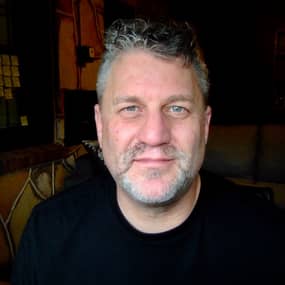
Managing Editor
Michael Boyink is a writer and photographer currently working remotely as a Managing Editor for a global software consulting and implementation company.
Michael, his wife Crissa (aka MsBoyink), and their two children spent eight years traveling the USA in an RV while continuing to work and homeschool.
While on the road, Michael and Crissa ran DitchingSuburbia.com, a popular website that provided resources, guides, and community for traveling families. Their story was covered by the Huffington Post, the Seattle Times, the Las Vegas Guardian, the Art of Noncomformity, Tiny House Magazine, and many other travel-related blogs and podcasts.
Michael and Crissa are now homeowners in rural Missouri where they continue to look for new ways to scratch the incurable condition known as hitch-itch.
Michael recently published Driven to Wonder, Eight years in an RV with two kids: A Memoir. The book is available in on Amazon.





























